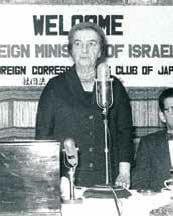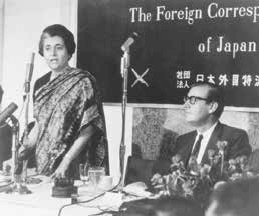Issue:


Israeli Foreign Minister Golda Meir (left) spoke at the FCCJ on Jan. 19, 1962. Seated to her right is Club President John Randolph (AP), noted for his Korean War reporting and bravery, and to her left is Igor Oganesoff (Wall Street Journal). Indira Gandhi (right), India’s Prime Minister, spoke at the FCCJ on June 27, 1969, some seven years after the appearance of Golda Meir. Seated next to her is Club President Henry Hartzenbusch (AP Bureau Chief) who was an innovative and tireless contributor to improving the Club. No. 1 Shimbun came into existence during his administration, as described in our history book.
BOTH GOLDA MEIR AND Indira Gandhi were exceptional speakers, and both were exceptional leaders who guided their respective countries through exceedingly difficult times. They proved themselves as equally competent and ruthless as men in winning political office, in achieving their goals and even in going to war when they deemed it necessary. The rise at the national level of such effective female leaders, joined in 1979 by Margaret Thatcher of the United Kingdom, established a standard to which later female leaders would aspire.
In her remarks at the Club in 1962 concerning Israel and the Arab states, Golda Meir emphasized that more needed to be done in education and in developing agriculture and industry, not the “nonsensical” waste of manpower and money spent on armaments and planning destruction. Meir went on to become Israel’s fourth prime minister (1969-1974). She was the fourth woman in the world to achieve such a high office and was known as the “Iron Lady” well before Margaret Thatcher was given the same epithet. Meir died of lymphoma in 1978.
During an official visit to Japan as India’s first woman prime minister, Indira Gandhi spoke at the FCCJ three years after assuming her high position. Although her remarks are not recorded in our history book, she no doubt explained the reason for her good will visit to Japan, and no doubt was bombarded by questions concerning a split in her political party and her recent success in putting down a Communist uprising in her country. Indian media and diplomats were impressed with the way she spoke and responded to questions with “supreme confidence,” said one Indian diplomat, Prem Budhwar in his book, A Diplomat Reveals. Gandhi served her first term as Prime Minister until 1977, and a second term from 1980 until she was assassinated by her Sikh guards in 1984 following destruction of a Sikh temple by the Indian military.
The historical contributions of these two leaders are well known, but one commentator pointed out that one thing they shared was a lack of brothers. Golda Meir had five of her eight siblings die during her early childhood in Russia. And Indira Gandhi was the only child of Jawaharlal Nehru, India’s first Prime Minister. The absence of brothers during childhood, he suggests, meant that they lacked contrasting gender experiences at home and grew up assuming equality with boys. Thatcher also shared this lack of male siblings, but never spoke at the Club.
— Charles Pomeroy

